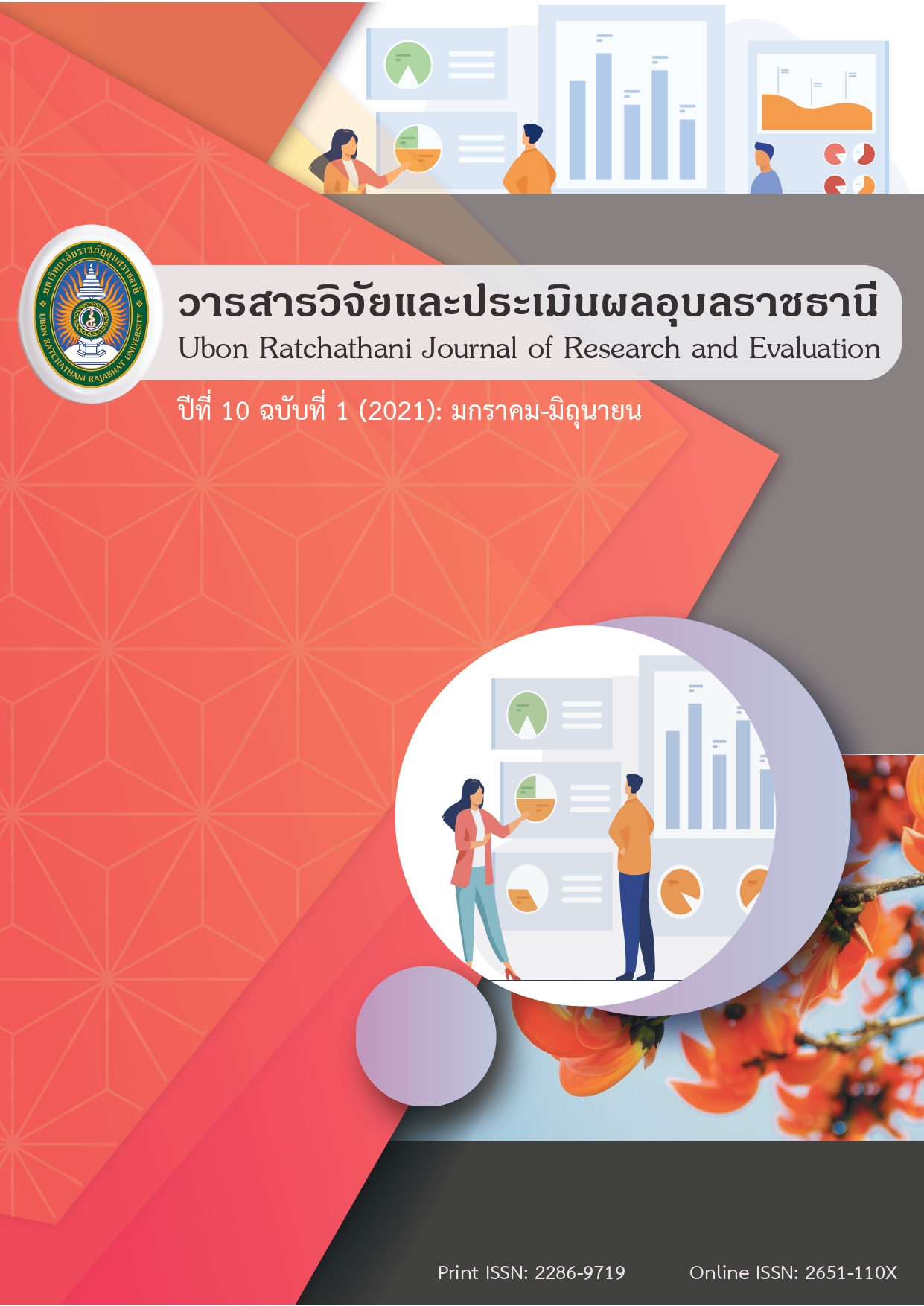การวิเคราะห์และศึกษาภาวะผู้นำการเปลี่ยนแปลงในชั้นเรียน ของอาจารย์มหาวิทยาลัย: การวิจัยแบบผสานวิธี
คำสำคัญ:
การวิจัยแบบผสานวิธี, ภาวะผู้นำการเปลี่ยนแปลงในชั้นเรียน, ภาวะผู้นำการเปลี่ยนแปลง, อาจารย์มหาวิทยาลัย, mixed methods research, transformational classroom leadership, transformational leadership, faculty membersบทคัดย่อ
การวิจัยครั้งนี้มีวัตถุประสงค์ คือ (1) เพื่อวิเคราะห์ระดับภาวะผู้นำการเปลี่ยนแปลงในชั้นเรียนของอาจารย์มหาวิทยาลัย ตามการรับรู้ของนักศึกษาบัณฑิตศึกษา (2) เพื่อศึกษาพฤติกรรมการสอนของอาจารย์มหาวิทยาลัยที่มีภาวะผู้นำการเปลี่ยนแปลงในชั้นเรียน และ (3) เพื่อศึกษาผลของพฤติกรรมภาวะผู้นำการเปลี่ยนแปลงในชั้นเรียนของอาจารย์มหาวิทยาลัย ที่เกิดขึ้นกับนักศึกษาบัณฑิตศึกษา การวิจัยครั้งนี้ เลือกใช้การวิจัยแบบผสานวิธี (mixed methods research) รูปแบบ Explanatory sequential design ระยะแรก เป็นการวิจัยเชิงปริมาณ ตัวอย่างวิจัย คือ นักศึกษาปริญญามหาบัณฑิตศึกษาทางการศึกษา ที่ลงทะเบียนรายวิชาวิธีวิทยาการวิจัย จำนวน 220 คน เครื่องมือที่ใช้ในการวิจัย คือ แบบสอบถาม วิเคราะห์ข้อมูลโดยใช้สถิติบรรยาย ได้แก่ ค่าเฉลี่ย ค่าส่วนเบี่ยงเบนมาตรฐาน ค่าเปอร์เซ็นไทล์ ระยะที่สอง เป็นการวิจัยเชิงคุณภาพ ผู้ให้ข้อมูลสำคัญ คือ นักศึกษาบัณฑิตศึกษาทางการศึกษา จำนวน 8 คน โดยการเลือกแบบเจาะจงนักศึกษาที่มีคะแนนการรับรู้ต่อภาวะผู้นำการเปลี่ยนแปลงในชั้นเรียนของอาจารย์มหาวิทยาลัย อยู่ในกลุ่มสูง เก็บรวบรวมข้อมูลเชิงคุณภาพด้วยการสัมภาษณ์ โดยใช้แบบสัมภาษณ์ วิเคราะห์ข้อมูลเชิงคุณภาพด้วยการวิเคราะห์เนื้อหา และการวิเคราะห์แบบสร้างข้อสรุปแบบอุปนัย ผลการวิจัยสรุปได้ดังนี้
ในภาพรวม ภาวะผู้นำการเปลี่ยนแปลงในชั้นเรียนของอาจารย์มหาวิทยาลัย ตามการรับรู้ของนักศึกษาบัณฑิตศึกษา มีค่าเฉลี่ยอยู่ในระดับสูง มีค่าเฉลี่ยเท่ากับ 4.26 ทั้งนี้ ผลการวิจัยเชิงคุณภาพสามารถอธิบายรายละเอียดพฤติกรรมการสอน คุณลักษณะ หรือบุคลิกภาพ ซึ่งครอบคลุมพฤติกรรมภาวะผู้นำการเปลี่ยนแปลงในชั้นเรียน ทั้ง 5 ด้าน คือ คุณลักษณะของการมีอิทธิพลอย่างมีอุดมการณ์ พฤติกรรมการมีอิทธิพลอย่างมีอุดมการณ์ การสร้างแรงบันดาลใจ การกระตุ้นทางปัญญา และการคำนึงถึงความเป็นปัจเจกบุคคล สำหรับผลของพฤติกรรมภาวะผู้นำการเปลี่ยนแปลงในชั้นเรียนของอาจารย์มหาวิทยาลัยที่เกิดขึ้นกับนักศึกษาบัณฑิตศึกษาซึ่งเป็นผู้เรียนรายวิชาวิธีวิทยาการวิจัย ได้แก่ การรับรู้ความสามารถของตนเองทางการวิจัย ความเต็มใจในการเรียนรู้ ความมุ่งมั่นในการเรียน ทัศนคติที่ดีต่อการวิจัย ความรู้ความเข้าใจเกี่ยวกับการทำวิจัย
เอกสารอ้างอิง
Thanomsuk, K. (2008). An analysis of direct and indirect effects of teachers’ transformational leadership on student qualities. [Master’s thesis, Chulalong University]. [in Thai].
Avolio, B. J., Bass, B. M. & Jung, D. I. (1999). Re-examining the components of transformational and transactional leadership using the multifactor leadership questionnaire. Journal of Occupational and Organizational Psychology, 72, 441-462.
Balwant, P.T., Birdi, K., Stephan, U. & Topakas, A. (2019). Transformational instructor-leadership and academic performance: A moderated mediation model of student engagement and structural distance. Journal of Further and Higher Education, 43(7), 884-900.
Bolkan, S. & Goodboy, A. K. (2009). Transformational leadership in the classroom: Fostering student learning, student participation, and teacher credibility. Journal of Instructional Psychology, 36(4), 296-306.
Bolkan, S. & Goodboy, A. K. (2011). Behavioral indicators of transformational leadership in the college classroom. Qualitative Research Reports in Communication, 12(1), 10-18.
Creswell, J. W., & Plano Clark, V. L. (2018). Designing and conducting mixed methods research (3rd ed.). Thousand Oaks, CA: Sage.
Esquilin-Perez, D. (2018). Faculty application of transformational leadership in a college success course (Publication No. 10846684) [Doctoral dissertation, Capella University]. ProQuest Dissertations Publishing.
Noland, A. & Richards, K. (2014). The relationship among transformational teaching and student motivation and learning. The Journal of Effective Teaching, 14(3), 5-20.
Pounder, J. S. (2004). The classroom leadership styles of Hong Kong University teachers: A case study of teachers in a business school (Publication No. UMI U187876). [Doctoral dissertation, University of Leicester]. UMI Dissertation Publishing.
Pounder, J. S. (2006). Transformational classroom leadership: The fourth wave of teacher leadership? Educational Management Administration & Leadership, 34(4), 533-545.
Pounder, J. S. (2008). Transformational classroom leadership: A novel approach to evaluating classroom performance. Assessment & Evaluation in Higher Education, 33(3), 233-243.
Pounder, J. S. (2009). Transformational classroom leadership: a basis for academic staff development. Journal of Management Development, 28(4), 317-325.
Pounder, J. S. (2014). Quality reaching through transformational classroom leadership. Quality Assurance in Education, 22(3), 273-285.
ดาวน์โหลด
เผยแพร่แล้ว
รูปแบบการอ้างอิง
ฉบับ
ประเภทบทความ
สัญญาอนุญาต
1. บทความที่ตีพิมพ์ในวารสารนี้ได้มีการตรวจสอบการลอกเลียนงานวรรณกรรมแล้ว ไม่เกินร้อยละ 25
2. บทความที่ตีพิมพ์ในวารสารนี้เป็นข้อคิดเห็น ข้อค้นพบของผู้เขียนบทความ โดยผู้เขียนบทความต้องเป็นผู้รับผิดชอบต่อผลทางกฎหมายใด ๆ ที่อาจเกิดขึ้นจากบทความนั้น ๆ
3. บทความ ข้อมูล เนื้อหา รูปภาพ ฯลฯ ที่ได้รับการตีพิมพ์ในวารสารวิจัยและประเมินผลอุบลราชธานี ถือเป็นลิขสิทธิ์ของวารสารวิจัยและประเมินผลอุบลราชธานี หากบุคคลหรือหน่วยงานใดต้องการนำทั้งหมดไปเผยแพร่ต่อหรือเพื่อกระทำการใดๆ จะต้องได้รับอนุญาตเป็นลายลักษณ์อักษรจากวารสารวิจัยและประเมินผลอุบลราชธานีก่อนเท่านั้น และจะต้องมีการอ้างอิงวารสารวิจัยและประเมินผลอุบลราชธานี ฉบับนั้น ๆ ด้วย






